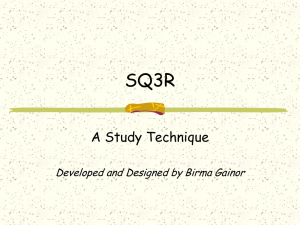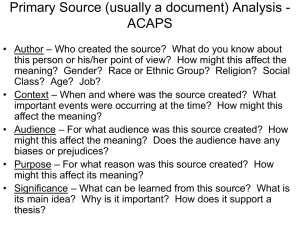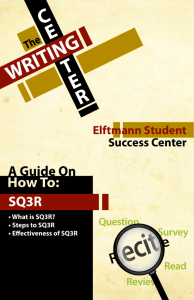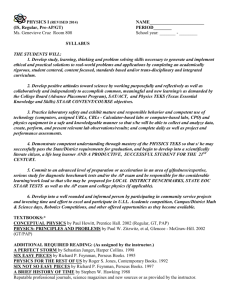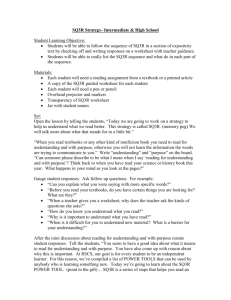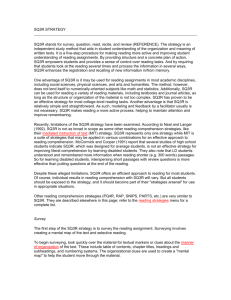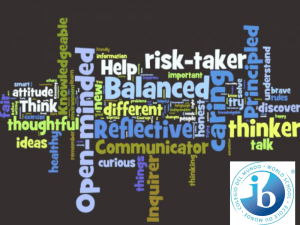Study Skills and Cognitive Strategies
advertisement
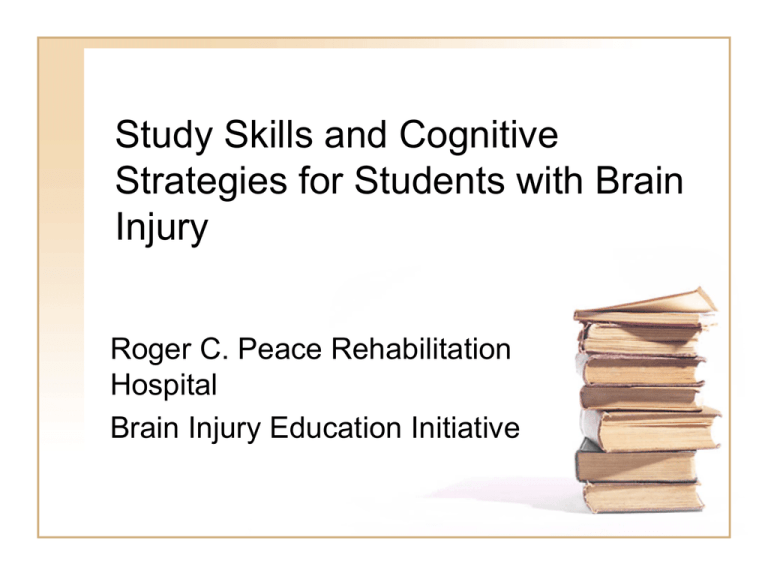
Study Skills and Cognitive Strategies for Students with Brain Injury Roger C. Peace Rehabilitation Hospital Brain Injury Education Initiative ATTENTION! • Please follow along with the narration for this presentation by clicking on the sound icon in the lower left hand corner of each slide. • Test here Funding provided by: Purpose: • The purpose of this presentation is to provide student’s with the tools they need to be successful in the classroom. So many students today, try and return to school without the skills they need to be successful. Students go back to school thinking they can rely on their old study habits. Often, they realize they are unprepared and need help when it comes to the specific needs of persons with brain injury. Objectives • Overview of Brain Injury and Return to School • Studying to Learn • Academic Success • Time Management • Memory’s Impact • Note Taking and Studying • Cognitive Strategies • Accommodations Common Complaints after TBI… • • • • • • • • • • • • Gosh, I’m slow! I can’t remember anything! Oops, I forgot my homework. It’s so hard to get started. I don’t know where to start. Reading is tough. My handwriting isn’t good. I’m so distracted! What did he say? I get tired so easily. I can’t keep up! This use to be so easy. Common Problems after a Brain Injury… that may impact your return to class Memory Impulsivity Attention Irritability Problem Solving Anxiety Organization Depression Initiation Social Skills Understanding Frustration Processing Vision Reading Writing Other Things to Watch out for and Speak up about… • • • • • • Headaches Poor Sleep Overstimulation Poor Endurance Fatigue Conflict with Friends Changes after Brain Injury …Things to remember for school re-entry • The age at time of injury will impact development • Pre-existing skills will impact and be impacted by the brain injury • No two brain injuries are exactly the same • The effects of a brain injury depend on such factors as cause, location and severity The Art of Studying Studying can be defined as… • A detailed critical inspection • The pursuit of knowledge by reading, observation or research • The act or process of applying the mind to understand • To read and examine for the purpose of learning How are YOUR study skills? • Have you thought about how you study? • Are you organized? • Do you manage your time well? • Since your brain injury, do you study differently? • Take this QUIZ to assess your STUDY SKILLS. How Do People Learn? • 1 % through TASTE • 1.5 % through TOUCH • 3.5% through SMELL • 11% through HEARING • 83% through SIGHT What Kind of Learner are You? • Figure out your learning style by taking this Quiz! Check out your results! • Visual Learner: you learn best by seeing things • Auditory Learner: you learn best by listening or hearing information • Kinesthetic Learner: you learn best by doing things • Now that you have identified what kind of study habits you have and what kind of learner you are… Let’s take a look at some basic steps to academic success. The Basics to Academic Success • Keep it the Same – Find a place to study – Stick to a routine and keep a schedule – Write down ALL your assignments ALL the time • Get going – Not later….NOW!! – Start on assignments AS SOON as you get them – Read ahead if you can The Basics to Academic Success • Break it down – Set small goals – Break assignments into smaller portions • More Is Better – Repeat, review, rehearse – this takes time! – Take frequent breaks…get up and stretch – Get a study buddy – Use your resources like parents or teachers The Basics to Academic Success • Your Goals – Set individual, academic, and personal goals – Get to know your teachers – Go to class everyday – Keep track of your grades – Get the phone number or email of someone else in your class (if you need to ask questions after school) – Find out what your school offers in terms of library support, tutors, or other resources What Time is it? • There are 168 hours in a week…how are you spending your time? • Time Management is one of the MOST important things to consider • Don’t Procrastinate • Fill out a weekly schedule and plan ahead • You have to study OUTSIDE of the classroom No Cramming!! How to Manage your Time • Use a time schedule NOT: I have to take a week out of work to finish this project. INSTEAD: I can use these times to work on my paper: Monday 7-8, Tuesday 5-6, and Saturday 8-12. • Learn how to tell time NOT: Researching for this paper will only take me one half hour. INSTEAD: Researching may not be easy, so I’ll start tonight and leave more time on Sunday. • Optimize your chances for success NOT: I’ll write this paper at home. INSTEAD: I’ll write this paper in the library, away from my TV. How to Manage your Time • Just get started NOT: I can’t write this paper until I feel inspired. INSTEAD: I’ll write what comes to mind now and revise it later. • Look at what you have accomplished and reward yourself NOT: I’ve hardly made a dent in all that I have to do. INSTEAD: I’ve finished my draft. I think I’ll take Saturday and watch a movie. How to Manage your Time • Set Priorities NOT: I don’t know where to begin, so I can’t start at all. INSTEAD: I’ll focus on this part because it’s the first assignment due. • Concentrate on 1 thing at a time NOT: It’s too much, I’ll never get it all done. INSTEAD: For this step, I only need to read, I’ll save the other part for tomorrow. • Set up small, specific goals NOT: I have to finish this paper by week 9. INSTEAD: If I write 2 pages a week, I’ll have it done by week 6. Some Helpers: • • • • Make your own calendar Fill out a daily schedule Make a “To Do” List Use technology: The Livescribe Pulse Digital Smartpen records your notes two ways: it creates digital copies of everything you write by hand while recording audio at the same time. Memory’s Impact… • Problems with recent (short) term memory – Student cannot hold information in memory long enough to respond to it • Problems with long term memory – Student is unable to store information for retrieval when needed and stored information cannot be accessed Memory’s Impact in the Classroom • Unable to follow directions • Unable to sequence several requests at one time • Completes only the first step of the request • Unable to recall vocabulary • Unable to carry out classroom routines • Loses place easily lessening the IMPACT of a memory problem • Learning and applying specific memory strategies can help improve not only your memory, but your performance in the classroom. Making It Stick – Memory Strategies Categorize and Chunk Repeat and Rehearse Associate Mnemonics and Acronyms Visualize Flashcards Categorize and Chunk • Group things together in meaningful sets • Categorize by similarities or differences • Group items into smaller pieces or “chunks” for easier recall • Examples: – Remember your friends based on how you know them…school, neighborhood, church, etc. – Remember phone numbers in smaller sections… (864) 555 - 1212 Repeat, Rehearse, Relate • Repeat information either aloud or silently to help you remember • Paraphrase the information, put it in your OWN words • Relate the information to your personal life and experiences • Use this strategy with others!!! – – – – ACT IT OUT EXAGGERATE RHYTHMIC SPACE IT OUT Associate • Make a meaningful connection or link between pieces of information • Link what you just learned with something you already know Mnemonics and Acronyms • Formulas, stories, key words, or rhymes that help you remember specific information. Have you ever tried to remember all the colors of the rainbow? Have you ever heard of Roy G. Biv? RED, ORANGE, YELLOW, GREEN, BLUE, INDIGO, VIOLET Visualize • Paint a picture in your mind • Retrace your steps • Use drawing to help aid this strategy Flashcards • Easy to use • Helps you test yourself • Portable, stick in your pocket and carry with you • Can draw information if that helps you remember Note Taking and Study Strategies The Basics… • • • • • Always date your notes Review your notes everyday if you can Teach what you know to others Listen for your teacher to repeat Be an active listener – Listen for your teacher’s voice to change – “Remember this…” – Ask questions and get clarification Note Taking • Visual – – – – – – Maps Use highlighters Diagrams and graphs Mind mapping Underlining Leave space to go back and write in • Auditory – Go to class – Clarify information – Talk to yourself (quietly!) – Ask questions – Tape record Note Taking • Kinesthetic – Participate in classroom activities – Raise your hand – Draw notes – Volunteer for things • Read/Write – – – – – – Complete an outline Use heading Copy notes over Read ahead Use a highlighter Scribe pen Steps to Highlighting 1. Read the paragraph and then go back to highlight: Main Idea Lists Dates Names Headings Headings Relevant Details Key Words Bold Faced Words 2. Turn bold faced heading into questions. 3. Highlight material that answers the question. Cornell Style 1. 2. 3. 4. 5. Cue Column: Draw a line down the left-hand side of your notebook page about 2 inches from the edge. After you take notes, this column will be used to write main ideas from your notes. Summary: Draw a 2 inch line across the bottom of your page. This space will be used last to write a two-to-three line summary of your notes. What’s Left? You use the large space in the middle to take notes. Read Notes: Soon after class, read over your notes. Use the CUE COLUMN to write in key words, phrases, main ideas, or questions you may have on your notes. Study: When studying, you should be able to cover the large space where you took your notes and recall the information based on the CUE COLUMN. Use the SQ3R method Survey Question Read Recite Review SQ3R…Survey • Survey-look through the text – The title, heading, and subheadings – Captions under pictures, charts, graph or maps – Review questions or teachermade study guides – Introductory and concluding paragraphs SQ3R…Question • Question-While you are surveying – change the chapter heading into questions and read to answer them – Read questions at the end of the chapters or after each subheading – Ask yourself, “What did my teacher say about this chapter or subject when it was assigned?” – Ask yourself, “What do I already know about this subject?” SQ3R…Read • Read- When you begin to read: – Look for answers to the questions you came up with – Answer questions at the beginning or end of chapters – Reread captions under pictures, graphs, etc – Read difficult passages slower – Stop and reread parts which are not clear – Read one section at at time SQ3R…Recite • Recite-After you’ve read a section – Ask yourself questions out loud – Summarize, in your own words, what you read – Take notes but write the information in your own words – Underline/highlight important points you’ve just read – Remember to use your method of learning…talk out loud, write it, practice it.. SQ3R…Review • Review- now’s your chance to see what you really know! – Cover up your key notes and see if you can remember! – Use flashcards – Ask a friend to quiz you – Write questions from your notes and try to answer them. Cognition…a fancy vocabulary word used to describe our thinking skills. • Cognitive skills include: – Reasoning – Problem solving – Attention – Memory – Processing Speed …the types of skills we need to be successful in school! Strategies and More Strategies • Keep “To Do” lists • Learn to break tasks into smaller, more manageable steps • Take rest breaks before you get tired • Ask for clarification • Ask yourself “Wh” questions • Make eye contact • Slow down More Strategies • • • • Ask for help! Talk OUTLOUD Eliminate distractions Try to “routinize” the day as much as possible • Use ear plugs to increase attention and screen out distractions (Parente & Herman 1996) Still having trouble? More Strategies • • • • • • • • Stop and Think Identify the problem Don’t jump to conclusions Brainstorm and generate several ideas Weigh the pros and cons Consider the consequences Choose the best solution Evaluate your solution Accommodations • Accommodations are specific techniques or modifications aimed to help students with brain injury in the classroom. • An IEP (Individual Education Plan) or 504 plan is required to receive accommodations. • Ask a teacher, school psychologist, or guidance counselor for help! Types of Accommodations • Think about how you can change or manipulate the following to make learning easier: – – – – – – Environment Materials/Technology Teachers Peers Even you, the student Your Family For Example: Memory Environment Consistent routines, sequences, and schedules; use visual aids, create environment that doesn’t rely on memory Instruction/ materials School staff Chunk work into manageable pieces, highlight important information, provide rehearsal and practice, use written instruction, provide prompts and cues, mnemonic devices Peers Buddy system, peer note taker, quiz each other using flashcards Student Use planners or journals, external memory strategies, keep routines, generate your own memory cues, teach compensatory strategies; awareness training Family Generalize strategies from home to school and vice versa Use repetition and consistency, create assignment sheet that all teachers can use, use routine and repetition For Example: Attention Environment Reduce factors that interfere with your ability to attend (noise, light), provide preferential seating in the classroom Instruction/ materials School staff Match the student’s abilities to attend; Plan activities that don’t exceed the student’s attention span; Break tasks into smaller parts Peers Educate peers on attention types and strategies; have them limit distractions and interruptions Student Use a timer to focus attention for a specific period of time, monitor attention to task, complete a pre-determined amount of work and then take a break; make sure you clarify information Family Discover your child’s interests, encourage good study habits Be sure student understands instructions, identify factors that facilitate/interfere with attention In Review… • Did you learn something that will make studying easier? • Did you learn something that will help you remember better? • Did you learn how to learn? • Will you be more organized? • Do you know who to go to if you need help?
